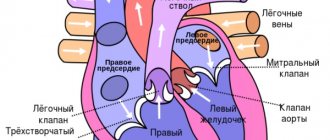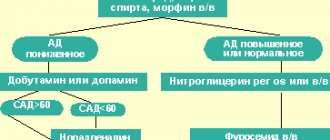Causes of the disease
The main causes of acute heart failure include the following diseases:
- pulmonary embolism;
- myocardial infarction;
- decompensation of CHF;
- cardiac tamponade;
- acute valvular insufficiency;
Heart rhythm disturbances and injuries to the heart muscle can also cause the disease.
The main reasons leading to the development of chronic heart failure:
- cardiosclerosis;
- angina pectoris (chronic ischemic heart disease);
- diseases of the valve apparatus of the heart muscle;
- arterial hypertension;
- chronic pulmonary heart disease.
Causes of heart failure in men
People at risk should closely monitor their heart condition. Get regular diagnostic tests if the following factors are present in your life:
- High cholesterol and unstable blood pressure with the development of concomitant pathologies affect the heart. Pay attention to these indicators if you have reached the age of 30.
- Regular smoking can increase the risk of developing heart failure by 4 times. The danger is not only from smoking, but also from being in a room where cigarette smoke is constantly spreading.
- Poor nutrition. With an unbalanced diet, the heart muscle weakens and other pathologies may appear. If you notice the first signs of the disease, you need to increase the amount of vegetables, fruits, legumes and seafood in your diet.
Other causes of heart failure:
- Disorders associated with heart function.
- Chronic infectious processes.
- Hormonal disbalance.
- Impaired absorption of nutrients.
Symptoms of the disease
Symptoms of heart failure come in different forms. It depends on which part of the heart muscle is most affected. Darkening of the eyes, fainting, dizziness, swelling of the neck veins, arrhythmias, pale skin, pain in the legs, swelling of the lower extremities, increased liver size, and the presence of free fluid in the abdominal cavity (ascites) may occur.
The following symptoms of heart failure are also observed:
- attacks of weakness and fatigue;
- decreased resistance to stress;
- heart rhythm disturbances.
In the later stages of the disease, complaints arise not only during exercise, but also at rest. The ability to work is completely lost. Due to insufficient blood supply, all systems and organs of the body suffer.
Symptoms of acute heart failure include:
- expanded borders of the heart;
- difficulty breathing (shortness of breath);
- increased heart rate;
- increased CVP (central venous pressure);
- hepatomegaly (increase in liver size).
The first alarming manifestations of insufficiency
If a man ignores the first, almost imperceptible symptoms, heart failure can manifest itself at any moment so that the person ends up in a hospital bed.
- Dizziness, fainting, fainting : this can happen at home, on the street, when leaving the room or on public transport. The consequences are extremely serious; saving a life depends on correct actions in the first minutes of an attack.
- Arrhythmia or tachycardia , irregular heartbeat, sensation of cardiac arrest.
- Shortness of breath , increasing day by day, first with exertion, then at rest.
Consequences
After a certain amount of time, the heart weakens until it can no longer contract strongly enough. This causes the volume of blood released into the systemic circulation to decrease.
The heart muscle tissue slowly dies and is replaced by scar tissue. Decreased blood output in the long term can lead to several consequences. Initially, patients notice swelling in their legs and experience shortness of breath. The supply of nutrients and oxygen to the body decreases, and then this is observed at rest.
Causes of heart failure in old age
Chronic heart failure (CHF) in older people develops as a result of the natural physiological processes of aging and is aggravated due to the progression of pathological changes that occurred at an earlier age. The main factor in the development of CHF is atherosclerosis, which leads to difficulties in coronary blood flow and disturbances in metabolic processes in the myocardium. The pumping function of the heart gradually weakens, and it can no longer satisfy the body's need to transport oxygen to the tissues. CHF due to age-related changes develops around 80 years of age. The severity of the lesions can vary from asymptomatic to disability due to limited physical activity.
CHF develops not only against the background of changes in the functioning of the heart muscle due to the consequences of damaging factors, chronic diseases of the cardiovascular system, but also due to processes associated with the biochemistry and physiology of the myocardium. At the age of 70–75 years, the first signs of heart failure can be seen. In 15% of elderly people, heart disease by this time passes into the decompensated stage. Progressive atherosclerotic changes lead to thickening of the vascular walls. The pathological process involves the aorta, main arteries and arterioles. Small vessels of the arterial bed are stretched, the damage spreads to the vessels of the brain and heart.
The occurrence of myocardial ischemia leads to the gradual replacement of muscle tissue with fibrous tissue, then diffuse or focal cardiosclerosis appears, and the ability of the myocardium to contract progressively worsens. Narrowing of blood vessels (stenosis) and other changes in their functioning increase the load on the left ventricle. Orthostatic hypotension is formed, the signs of which are dizziness when changing body position.
Scar changes affect the aortic hydrovalve; loss of plasticity is complicated by the deposition of calcium salts in the tissues. The load during the work of the left ventricle increases, as the closure of the valves is disrupted. Thus, the functioning of the mitral valve cannot ensure the normal course of life processes.
After 10 years, signs of valvular insufficiency appear. The older a person gets, the more the functioning of the thymus gland becomes impaired and the body’s immune defense weakens. As a result, a malfunction occurs in the coordinated functioning of the heart, it cannot pump through itself the required volume of arterial blood, a sufficient volume of oxygen ceases to flow into organs and tissues, and the right parts of the heart are subject to increased load. The risk of CHF increases if the patient already has the following diseases:
- arterial hypertension;
- thyrotoxicosis;
- myocarditis;
- hypothyroidism;
- acquired and congenital heart defects;
- pericarditis;
- chronic obliterating pulmonary disease;
- cardiosclerosis of atherosclerotic or post-infarction origin;
- toxic and allergic damage to the myocardium.
We recommend
“Stroke in an old person: causes and consequences” Read more
Diagnostics
Diagnosing heart failure is fairly easy. In people with heart disease, diagnosis is usually made based on clinical presentation using the NYHA (New York Heart Association) classification.
Echocardiography and other instrumental methods are used to identify the preclinical stage, when there are almost no obvious symptoms of heart failure. For early diagnosis, it is very important to conduct a special stress test, since most often only this can determine the presence of the disease. In this regard, patients with heart disease need to undergo a medical examination with their attending physician once every 6 months with appropriate tests.
Treatment methods for chronic heart failure
The main task in the treatment of CHF is to achieve stabilization of the underlying disease. Various specialists can be involved in achieving this. For example, if heart failure is caused by cardiac arrhythmia tachyform on the background of autoimmune thyroiditis with hyperthyroidism, the patient should be monitored by both a cardiologist and an endocrinologist.
Acute respiratory diseases can cause exacerbation of chronic diseases, including worsening the severity of CHF, and therefore it is recommended to prevent ARVI, i.e., for example, get vaccinated before the onset of the epidemic season.
Drug treatment
Different groups of drugs are used. The approach in each case will be individual - depending on the concomitant pathology and the reasons that caused the exacerbation of the disease.
Make an appointment Do not self-medicate. Contact our specialists who will correctly diagnose and prescribe treatment.
Rate how useful the material was
thank you for rating
Treatment of the disease
It is necessary to distinguish between the treatment of heart failure occurring in acute and chronic form.
Treatment of acute heart failure. This disease begins sharply and suddenly. It grows quickly and then turns into an attack of suffocation. There is a severe cough with expectoration of foamy contents and other symptoms of pulmonary edema or cardiac asthma. Therefore, treatment of heart failure begins with calling a doctor and providing first aid. The patient is admitted to the hospital, where he is under strict supervision. The cardiologist, in accordance with the patient’s condition, prescribes an appropriate course of treatment.
Treatment of chronic heart failure. It is usually carried out at home. The process begins with treating the disease that caused the syndrome to develop. It is important to maintain psycho-emotional peace and engage in physical therapy in a medical institution (only under the supervision of a specialist with appropriate education).
A diet must be prescribed, limiting fluid intake to 1,200 ml and salt to 4 g (sometimes to 1-2 g per day). Food should be high in proteins, minerals and vitamins. Consumption of carbohydrates and fried foods is necessary to reduce the risk of obesity. Patients with heart failure are prohibited from eating spicy foods.
If edema is present, diuretics are prescribed. Sometimes they are combined with drugs containing potassium. During the period of use, you need to monitor the results of a blood test to determine the level of uric acid, potassium, sodium and monitor the acid-base balance.
Surgical methods for treating heart failure. Such treatment methods include:
- coronary artery bypass grafting;
- operations on heart valves, which lead to a decrease in the load on the myocardium;
- heart transplantation.
When to rush to the doctor
Heart failure is a syndrome that increasingly leads the stronger half of humanity to loss of ability to work, disability, and it also becomes the cause of death.
You should call a doctor immediately if you experience any of the following sensations:
- Symptoms and treatment of heart failure in old age: detect it in a timely manner!
- sudden lack of air;
- sharp pain under the shoulder blade, in the left arm, numbness;
- feeling of discomfort in the heart area;
- fear, most often the fear of death after a sudden awakening at night (lack of oxygen causes the brain to experience exactly this feeling at critical moments, as cardiologists note);
- nausea, vomiting, sometimes diarrhea along with arrhythmia and chest pain.
Men definitely need to see a therapist, who will decide on hospitalization or refer them to a cardiologist. Sometimes men, suspecting an attack of osteochondrosis, lose precious minutes and hours in queues to see a surgeon or neurologist .







